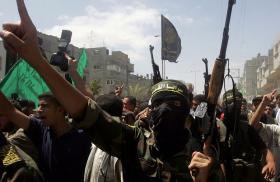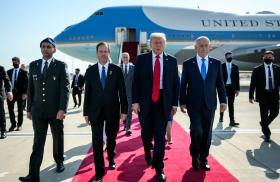Why change the succession from King Hussein's brother, Hassan, to his eldest son, Abdullah? The principal reason for the change appears to have been paternal loyalty taking precedence over fraternal loyalty. Rationales based on real policy differences between Hussein and Hassan should largely be discounted; if anything, the two were closer in recent years than in years past, especially on the issue of peace with Israel. There were additional factors that firmed up the decision -- family feuding, charges and counter-charges of corruption and meddling, contradictory allegations that Hassan was too kingly and not kingly enough. This was probably not a quick decision; rather, the signs could be found going back at least six months and perhaps further.
> The King's letter to Hassan is a vitally important vehicle for understanding this episode, mostly because it provides insights into how Hussein would like the world to view the decision and the decision-making process. The King appears to have provided the answer in his letter to Hassan, when Hussein recounted Hassan's alleged unwillingness to permit his (Hassan's) successor to be named by a family council rather than by himself. Evidently, the king came to conclude that the only way to ensure that his sons would eventually rule was to make sure that his son succeeded him directly.
What was surprising was the speed and manner of the change. Here, two points are salient. First, it seems as though the King left his sickbed to return home and make the change. To believe that he had a clean bill of health one day and then a relapse the next stretches incredulity. Second, it also seems as though the King was bent on destroying Hassan politically, not just replacing him. Taken together, this means that the speed and manner of the sacking was the only way to ensure that the eventual naming of his son as King would pass without opposition or protest -- i.e., Hussein evidently believed he had to attack Hassan to make sure than Abdullah would inherit the throne without difficulty. Whether this was indeed necessary, no one will ever know.
If the king passes soon: The key near-term variable is how long the king will live. If he survives bone marrow surgery and returns to Amman to act as king, for even a brief period, it makes a big difference than if he, regrettably, passes soon. If the latter occurs, then Jordan will be -- virtually overnight -- without the leadership of the two people that have been a leadership team since Lyndon Johnson was president -- the brother combination of Hussein and Hassan. Both their sets of shoes will have to be filled. So far the signs are not strong that Hassan is being urged by the King's supporters (or the new Crown Prince's supporters) to play the elder statesman's role that would greatly benefit the kingdom.
Without King Hussein and Prince Hassan, Jordan loses the two most forward thinking Jordanians on the issue of peace. In the Jordanian system, King Hussein was not a consensus-builder on the issue of the peace process; he was a trail-blazer. In the dark days of September/October 1993, just after the Oslo accords had been signed, most of the "King's men" were telling him to hunker- down and go into a Fortress Jordan, East-Bank-only mindset; he and Hassan decided against that advice and have been fighting an uphill battle against the Jordanian elite ever since. Filling that gap will not be an easy task. Unless a very high bar is set now on peacemaking and normalization with Israel, then it is be sure to be lowered with the passage of time. It is important to note that Abdullah has played a positive role in this process, and there is no reason to suggest that it will not be maintained. But a positive role is one thing; a driving, iconoclastic role is something else.
> Should the king die, Abdullah will immediately face an internal challenge. Will there be a run on the dinar, as there was when the King left for treatment last summer, and as there was, briefly, when the change was made last month? Or will the dinar remain stable, as is currently the case? Will the stability of the dinar be purchased at a high price, namely heavy reliance upon certain financial centers in the country? Jordan's economy was shaky when the King's health was good; it has been teetering for some months now; the sacking of Hassan and the illness of Hussein cannot build confidence among foreign investors. The human capital in Jordan is deep enough for that country to become a success story but it will take time, leadership, and a willingness to do business differently than before. None of those are certain, though the potential is there.
The second challenge will be from Jordan's nemeses -- Yasir Arafat, Hafiz al-Asad, and Saddam Hussein. Each in his own way -- and perhaps all three simultaneously -- will test the new King Abdullah, directly or indirectly. How Abdullah meets those tests will determine how these three, and others in the region, view him for quite some time. He is not completely inexperienced in these matters. He is one of the few people in the world to have met face to face with the quartet of Qadhafi, Asad, Saddam, and "Great Leader" Kim Il Sung. It also looks as though Jordan is likely to receive a boost from some of its more recent regional antagonists. Kuwait is about to renew diplomatic relations with Jordan; Saudi Arabia and the UAE may even begin to provide some financial assistance to Jordan.
> On Jordanian-Palestinian relations, Abdullah is viewed within Jordan as a breath of fresh air, while Hassan was viewed with anxiety. While that perception may not be based completely on reality, the perception is real nonetheless. Palestinians on both sides of the Jordan river are generally gleeful at Hassan's ouster and delighted with the new crown prince. Abdullah is married to a young woman from a prominent Palestinian family. Perhaps more importantly, Abdullah himself has no experience of confrontation with the Palestinians; he was only a child in 1970/71. On the all-important final status issues, officials close to the King say that Abdullah's views are his father's, including the idea that Jordan should not fear the establishment of a Palestinian state.
One should also note that the Muslim Brotherhood in Jordan congratulated Abdullah and sent him a formal cable to that effect, even before the Jordanian parliament did the same. Perhaps they are looking to have a new leaf turned from the regime. It would not be surprising for Abdullah to try to usher in an era of political liberalism -- that is what young King Hussein started out doing when he first took over. At the same time, if we are to believe those that tout Abdullah's military experience as a sign that he has the strength and determination to lead, then we can't also interpret his background as being particularly liberal or open to democratization. It may be the case but the record doesn't suggest it.
> Who are Abdullah's men? Reportedly, the two closest to him are Abdul Karim Kabariti, the former prime minister who never hid his disdain for Hassan, and Intelligence Chief Major General Samih Batikhi, who is reported to be in line to make the move to a civilian posting. Abdullah has also been careful to include current Prime Minister Tarawneh as a full participant in recent meetings, including with Secretary of State Albright. Of the three, Tarawneh was the most associated with Hassan but it is fair to say that he is a loyal servant of the regime. These three, it seems, are this generation's "king's men."
Implications for the United States: First, surprise is the order of the day. U.S. officials were surprised by the time and manner of Hussein's decision, even if some believed that a change was in the works.
Second, the institutional experience that has been built up regarding Hussein and Hassan needs to be revisited. The United States needs to build new relationships. Some of this is already in the works due to Abdullah's frequent visits to the United States to lobby on behalf of increased military support. He is well known in the Pentagon, less so elsewhere.
Third, economics is key. The United States has already upped significantly its aid to Jordan. Not too long ago, economic assistance to Jordan was only $6 million a year; in 1999 it will be $200 million. At these new levels, aid will be about 8 percent of GDP, which is, for comparative purposes, far more as a percentage of GDP than Israel gets. While this is important and necessary, the United States would not be doing Jordan a service if it does not also push hard for an economic reform program. This includes the fight against corruption.
Fourth, the two key policy issues for the United States are the peace process and Iraq. As noted above, the combined absence of Hussein and Hassan would be a blow to the former. On Iraq, Abdullah may, in fact, be more forward-leaning than on the normalization with Israel. It was his soldiers that were fighting infiltrators from Iraq almost every night along the border last summer; it is his friend and ally, Kabariti, that led the get-tough campaign on Saddam in the mid-1990s. Iraq policy is an area where more cooperation with U.S. anti-Saddam efforts might be forthcoming from the Jordanians.
> The bottom line is that Jordan has enduring interests which any new king would pursue. The question is how he pursues them. King Hussein has always lived by the axiom, "deal with today's problems, today; tomorrow's problems tomorrow." For a country in Jordan's position, this appears to be good policy. What remains to be seen is whether a new king can live by it, too.
This Special Policy Forum Report was prepared by Harlan Cohen.
Policy #365



